大学体验英语一周一练答案
- 格式:doc
- 大小:78.00 KB
- 文档页数:15
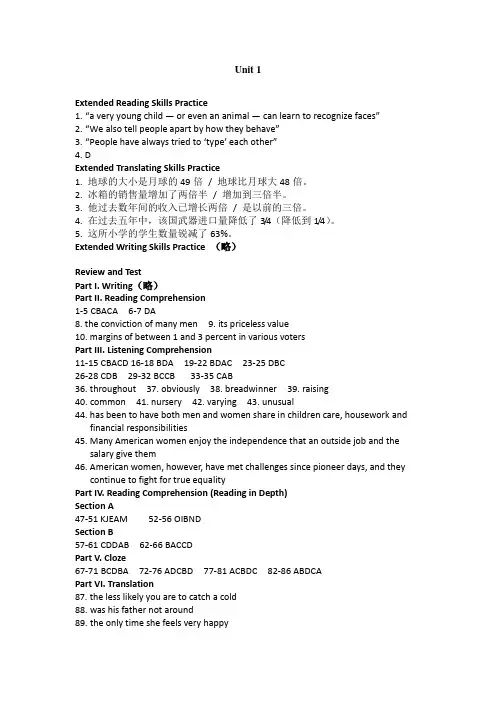
Unit 1Extended Reading Skills Practice1.“a very young child— or even an animal —can learn to recognize faces”2.“We also tell people apart by how they behave”3.“People have always tried to‘type’ each other”4. DExtended Translating Skills Practice1. 地球的大小是月球的49倍/ 地球比月球大48倍。
2. 冰箱的销售量增加了两倍半/ 增加到三倍半。
3. 他过去数年间的收入已增长两倍/ 是以前的三倍。
4. 在过去五年中,该国武器进口量降低了3/4(降低到1/4)。
5. 这所小学的学生数量锐减了63%。
Extended Writing Skills Practice (略)Review and TestPart I. Writing(略)Part II. Reading Comprehension1-5 CBACA 6-7 DA8. the conviction of many men 9. its priceless value10. margins of between 1 and 3 percent in various votersPart III. Listening Comprehension11-15 CBACD 16-18 BDA 19-22 BDAC 23-25 DBC26-28 CDB 29-32 BCCB 33-35 CAB36. throughout 37. obviously 38. breadwinner 39. raising40. common 41. nursery 42. varying 43. unusual44. has been to have both men and women share in children care, housework andfinancial responsibilities45. Many American women enjoy the independence that an outside job and thesalary give them46. American women, however, have met challenges since pioneer days, and theycontinue to fight for true equalityPart IV. Reading Comprehension (Reading in Depth)Section A47-51 KJEAM 52-56 OIBNDSection B57-61 CDDAB 62-66 BACCDPart V. Cloze67-71 BCDBA 72-76 ADCBD 77-81 ACBDC 82-86 ABDCAPart VI. Translation87. the less likely you are to catch a cold88. was his father not around89. the only time she feels very happy90. are not as important to fathers91. Those fathers who strive to be good family menUnit 2Extended Reading Skills Practice1-5 FOFOOExtended Translating Skills Practice1. 他的数学分数在班上是名列前茅的。

大学体验英语(第三版)一周一练2答案及听力原文一周一练2参考答案及听力原文Keys (Unit 1)Key to Extended Reading Skills Practice Practice for skimmingSome American universities have become famous for different reasons over the years. For example, Harvard University is famous for its long history, Princeton University is known as its religious revival, and Yale University is well-known for its prolificacy of presidents, such as George H.W. Bush, William Clinton and George W. Bush, etc.Key to Grammar Focus Practice for the subjunctive mood1) (should) be 2) hadn’t been 3) (should) wait 4) had left 5) (should) beKey to Review and Test (1) Part II Reading Comprehension (Skimming and Scanning)1-7 BDDCA BD 8. a bachelor’s degree9. endowments 10. coeducationalPart III Listening Comprehension 11-35 DADDD ABABB BDCDB BACAB DBCDC36. combination 37. instruction 38. testing39. nation40. religious 41. excel 42. attract43. advancement44. these schools have developed an interesting method of international communication.45. whether government officials or ground-breaking scientists46. the fame of a school cannot be determined only by the number of students that it has or even the number of teachers.Part IV Reading Comprehension (Reading in Depth) 47—56 BDIFJ NOHLC 57—61 DBDCB 62—66 CDADBPart V Cloze 67—76 BADBA BCCDA 77—86 CDBCB ACDABPart VI Translation 87. is eligible to join the club88. on the basis of their own tastes89. Tom be assigned to clean the room90. Just as Peking University is one of the oldest universities in China91. enables students to travel half-price on trains听力原文Section A11. W: Why are you leaving so early? The party doesn’tstart until seven.M: Tomorrow morning I have to attend a math test.Failing an exam is a nightmare for me.Q: Why does the man have to leave so early before 7?12. M: So when are the other students going to get here?The train is leaving in 10 minutes. We can’t waithere now.W: It’s 9:00 already. They’re supposed to be here soon. I told everybody to meet here by 8:50.Q: When is the train leaving?13. W: I’m looking for a novel for my literature course.It’s called Gone with the Wind. Do you have it?M: Yes, we do. You’ll fin d it in Section 8, on the top shelf.Q: What’s the woman speaker’s occupation?14. M: You seem very confident about the job interview,don’t you?W: Yes, I have studied almost everything about finance and economics. And I bought a good suitand I had my hair cut.Q: Where is the woman probably going to work? 15. M: Are there any more questions on this lecture? Yes,Helen.W: Professor Newven, do you think an independent candidate could become president?Q: What most probably is Helen?16. M: I forgot to bring paper and a pencil to take notes within class.W: That’s all right. I have enough for both of us.Q: What will the woman probably do?17. M: We have worked long enough for a Saturday afternoon.W: Ok. Let’s call it a day.Q: What does the woman mean?18. W: Are you pleased that your son wants to be a dentist?M: Not really. I’d rather he managed my store when I retire.Q: What does the man want his son to become?Now you will hear two long conversations. Conversation 1John: I wonder if this is going to be an interesting class. Lily: Yeah. Me, too. So, what’s your major?John: Well, I’ve been batting around the idea of going into business, but I haven’t decided yet. And mydad keeps telling me I have to choose a majo r, but I’m undeclared at the moment.Lily: Ah, that’s what happened to me my freshman year. John: Oh, so what year are you in school?Lily: I’m a senior, and I only have to take 10 more credits to graduate. Yeah!John: Well. That must feel great to be almost finished with school.Lily: You can say that again, but once I graduate, I have to start repaying a student loan, so I’m not looking forward to that.John: But didn’t your parents help you out with your college tuition?Lily: No. My dad said he wasn’t m ade of money, so he thought I should earn my own education, so I worked like crazy in the summer and part-time during the school year to cover most of my costs.John: Well, you know, at least you see the light at the end of the tunnel.Lily: That’s true.John: Yeah. Well, um . . . , nice talking with you. I have . . . I have to go.Lily: Same here. Bye.Questions 19 to 21 are based on the conversation you have just heard.19. What is John’s problem as a freshman?20. How many credits left does Lily have to take to graduate?21. Why didn’t Lily’s parents help her with her tuition? Conversation 2W: Hi, honey, you are sitting here long, thinking, for what?M: You know, in the digital age, getting students into classrooms is really hard.W: Oh, really?!M: They also use phones and laptops to search for information even during class.W: Anyway they are good for still attending your class! M: Not yet, they consider it a trifle thing to skip classes.I’m just thinking how to lure them to attend class.Any ideas?W: How about rewarding students with food if they are sitting in the first row of your course? I always do this for our naughty son.M: Sounds good, but they busy themselves with their cell phones and keep their heads down until they hearsomething interesting.W: A teacher is not the boss. Give them permission with phones. They might hesitate to participate in class discussions, but what if they could send a message instead of speaking out loud?M: En, maybe you are right, they will feel relaxed if they don’t like standing up and getting everybody’s attention.W: Yes.M: Now I need to open a micro blog webpage for my students to voice opinions via their cell phones. Questions 22 to 25 are based on the conversation you have just heard.22. What do we learn from the conversation?23. Which one is NOT true about students according tothe conversation?24. What does the woman ask the man to do?25. What’s the probable relationship between the twospeakers?Section B: Passage OneFounded in 1898, Peking University is the first national university in Chinese modern history. Peking University consists of five faculties: Humanities, SocialSciences, Sciences, Medicine, and Information and Engineering. The University has 47 colleges and departments, and offers 105 undergraduate programs, 291 graduate programs, and 249 doctoral programs. While emphasizing basic sciences, the university has paid special attention to the development of applied sciences. In October 2010, there were 14,810 undergraduates, 12,082 postgraduates and 6,838 doctoral candidates. The campus has approximately 2,326 long-term international students from 80 countries, and 1,836 degree-seeking students.Peking University is famous for its outstanding research facilities and highly-qualified teachers and researchers with extensive research interests and profound knowledge. The University has 5,866 full-time faculties, of whom 1,701 are professors and 2,037 are associate professors, 60 academicians of the Chinese Academy of Science, and 8 academicians of the Chinese Academy of Engineering. Peking University has 11 national key laboratories, 46 state key laboratories, 2 national engineering research centers and 8 affiliated hospitals and health centers.The Peking University library is the largest universitylibrary in Asia, with a collection of 7.7 million books and Chinese and foreign journals and newspapers. The library serves as a comprehensive modern information center.Peking University emphasizes academic exchanges with foreign universities, research institutes and multinational enterprises, signing agreements with more than 200 universities in 50 countries and regions. Questions 26 to 28 are based on the passage you have just heard.26. When was Peking University founded?27. What has Peking University paid special attention towhile emphasizing basic sciences?28. Which library is the largest university library inAsia?Passage TwoThe number of students from China studying at universities across the United States has increased dramatically. Los Angeles county has one of the largest Chinese student populations in the U.S.—totaling more than 4,000 students.At the University of Southern California in Los Angeles, it is not difficult to spot students from China.They gather regularly for social events, such as Mid-Autumn festival.Ferdinando Guerra, an economist with the Los Angeles County Economic Development Corporation, said the number of Chinese students studying in the United States has almost tripled in the past decade, and has almost quadrupled since 1995.The main reason for the dramatic increase is the growth of the Chinese economy. There are a lot of Chinese entrepreneurs, businessmen of all sorts, business leaders, who are simply wealthier today, and they can afford to send their sons and daughters abroad. In addition, the number of undergraduate students from China in the United States has doubled during the past two years, said University of Southern California’s Dean of Religious Life, Varun Soni. He said that although Chinese students typically study engineering and the hard sciences, a new generation is starting to major in subjects such as business, education, and film. In addition to more integration of the East and the West, economists say Chinese graduates of American universities who return to their homeland also could help foster more Chinese investment in the UnitedStates.Questions 29 to 32 are based on the passage you have just heard.29. How many Chinese students study in Los Angelescounty?30. How many times has the number of Chinese studentsstudying in the United States increased compared to ten years ago?31. What’s the main reason for the dramatic increase ofthe number of Chinese students studying in the United States?32. Which of the following subjects that the newgeneration of Chinese students is starting to major in is not mentioned in the passage?Passage ThreeMost American colleges and universities take a spring break. Students might go home to their families or spend a week partying on a warm beach with no parents around. That is the popular image, at least.In the United States, the legal age to drink alcohol is twenty-one—one of the highest in the world. Americans debate whether it should be lowered, or whether young drinkers would only drink more. In parts of Europe, thelegal drinking age for beer, and sometimes hard liquor, is sixteen. Yet France may raise the age limit for beer and wine sales to eighteen, the same as for hard liquor there.Rules on alcohol differ from college to college in the United States. Many schools require all first-year students to take an alcohol prevention and education program, often given online. Some have a “zero tolerance” policy where alcohol is banned from all buildings. Parents are informed of violations and students may be suspended.At the University of Virginia in Charlottesville, permission is needed to serve alcohol at any event on campus. But alcohol is banned in first-year dorms—where most students are under twenty-one anyway. Questions 33 to 35 are based on the passage you have just heard.33. How do students in most American colleges spend their spring break?34. What is the legal age to drink alcohol in the United States?35. Which one of the following statements is true?Keys (Unit 2)Key to Extended Reading Skills Practice Practice for Scanning1) Running the show and setting the tone and culture for the entire school2) Knowing the room parent 3) the school nurse4) let you know any problems on the bus5) the principal, the school nurse, the room parent, theguidance counselor, the school bus driverKey to Grammar Focus Practice for unreal conditions:1) If I had spoken to him yesterday, I would know what to do now.2) If some people didn’t drive so fast, there wouldn’t be so many accidents now.3) If they had had enough money, they could have gone by air.4) The flower wouldn’t have shrunk if she hadn’t washed it with hot water.5) If he were not running a high fever, we could ask him to show up at the party.Key to Review and Test (2) Part II Reading Comprehension (Skimming and Scanning)1—7 BDCAC BD 8. payslip 9. higher 10. different specialties or professionsPart III Listening Comprehension11—35 BDCBD CADBD CBBBC CABDA DCCBA 36. hunting 37. laid off 38. sort 39. natural 40. hardship 41. crossroads 42. stumbled 43. accustomed44. your job search and the payoff will be your new job45. to get started is to jump right in 46. you just need to get started on that roadPart IV Reading Comprehension (Reading in Depth)47-56 ECKLA IMOGJ 57-61 ADADC 62-66 DCCABPart V Cloze 67-76 BADBD ABCCA 77-86BDACA ABCCAPart VI Translation 87. when the book becomes available88. we couldn’t have made it on time89. while he prefers it with cream 90. By accessing the website of the company91. no one would blame you听力原文Section A:11. M: You’ve got a good result in your research,haven’t you?W: Yes, but much remains to be done.Q: What does the woman mean?12. W: Good morning, Professor David, my name isSusan Gray, I’m with the local newspaper. Doyou mind if I ask you a few questions?M: Not at all. Go ahead, please.Q: What is Susan Gray?13. W: I’m going to Martha’s house; I have a paper tocomplete and I need to use her computer.M: Why don’t you buy one yourself? Think how much time you could save?Q: What does the man suggest the woman do? 14. M: Hello, Mary. This is John at the office. Is Tomfeeling any better today?W: Oh, yes, John. He’s feeling much better now. But the doctor says he will have to stay in bed until Monday.Q: Where is Tom now?15. M: Excuse me, I’m looking for the textbook byProfessor Jordan for the marketing course.W: I’m afraid it’s out of stock. You’ll have to order it. And it will take the publisher three weeks to send it to us.Q: Where did this conversation most probably take place?16. W: Robert worked as a secretary for three years.Then he became a newspaperman. After that he started writing.M: I know. And he is writing a story.Q: What is the man’s o ccupation now?17. W: Did you attend Alice’s presentation last night?It’s the first time for her to give a speech to alarge audience.M: How she could be so calm in front of so many people is really beyond me.Q: What do we learn from the conversation?18. W: In my opinion, watching the news on TV is agood way to learn English. What do you think? M: It would be better if you could check the same information in English newspapers afterwards.Q: What does the man say about learning English? Now you will hear two long conversations. Conversation 1W: What do you think of college couples looking to work together?M: It sounds odd. You know, many lovers tend to avoid revealing their private life to employers.They are simply shy or fear being rejected fordoing so.W: But things are changing. Many couples are choosing jobs in the same workplace.M: Why? Any advantages?W: They think they can spend more quality time together. Share the fares of taxi; rent a house near the office together…M: Yes, quite practical!W: Apart from practical issues, they like to discuss problems with someone who truly understands them.M: But, it’s up to employers’ attitudes, right?W: In fact, more and more companies have begun to consider recruiting talents in pairs.M: Really!? Why?W: For example, teaching jobs and the health sectors often welcome couples because a pair is usually more stable.M: But, what if they break up? Couples can also cause trouble.W: Right, they will look unprofessional if you have a quarrel at work. I also hear some companies don’t allow couples to work in the same team or have aboss-subordinate relationship.M: En, yes, that’s because those pairs may behave too intimately, which causes the problem of where to draw the line. Meanwhile, working with other colleagues will be easier.W: Anyway, young lovers should think carefully before deciding to work together.Questions 19 to 22 are based on the conversation you have just heard.19. What are the two persons talking about?20. Why do many lovers hesitate to go to a job fairtogether according to the man?21. Which is not an advantage of couples looking towork together according to the woman?22. Which is not an disadvantage of couples looking towork together according to the conversation? Conversation 2M: Morning, Brenda.W: Good morning, Mr. Browning.M: Er, did you put that ad in yesterday?W: Yes.M: The ad for a junior sales manager, I mean.W: Yes, it went into the Standard and the EveningNews.M: That’s good. Erm, well ...W: What kind of person have you got in mind for this job?M: Oh, well, somebody fairly young, you know, twenty something, like 21, or 25.W: Erm, what a sort of young man have you got in mind?M: Oh, you know, a good education, polite, responsible, and easy to get along with. What I don’t want is one of those young men just out of university, with exaggerated ideas of his own importance.W: Yes, erm, what sort of education are you actually looking for?M: Well, you know, a couple of A levels. Must have English, of course.W: Yes, I think you’re asking quite a lot. I mean you’re not really prepared to pay all ...M: No, I’m not prepared to give him a big salary to start with. Nevertheless, I want someone with plenty of ambition, plenty of drive. You know, not looking at the clock all the time.Questions 23 to 25 are based on the conversation youhave just heard.23.What is the purpose of running the ad? 24.What kind of person will meet the job requirements?25.Why doesn’t the man prepare to pay a bigsalary to start with?Section B: Passage OneHonesty is often said to be the best policy in social situations but being yourself at work is not a good idea for your career, research suggests.While revealing your true character to a partner or friends is likely to make you happier, experts claim doing so at the office is not a recipe for promotion. Scientists assessed levels of “authentic self expression” in 533 volunteers to see how far they opened up to people they interacted with socially.The results showed that participants were more likely to “be themselves” with partners, followed by friends and then parents. However, they were much less likely to show their true self to work colleagues.Those who opened up to their partners tended to have greater well-being and were more satisfied with life. But the same benefits were not seen from being authentic at work.Dr Oliver Robinson, from the University of Greenwich in London, said: “You hear self-help gurus say that the secret of happiness is ‘being yourself’ or ‘expressing your true feelings’, but that doesn’t seem to apply in the workplace.”“So in some circumstances, it may be that a polite smile or tactfully keeping quiet may be more conducive to your well-being than saying what you actually think and feel to work colleagues.”The results were presented at the annual meeting of the British Psychological Society, taking place in London.Questions 26 to 28 are based on the passage you have just heard.26. How many volunteers did the scientists assess?27. Whom were the participants much less likely to show their true self to?28. Where did the annual meeting of the British Psychological Society take place?Passage TwoAmericans hate their jobs more than ever before in the past 20 years, with fewer than half saying they are satisfied.The trend is strongest among workers under the age of 25, less than 39 percent of whom are satisfied with their jobs.Workers age 45 to 54 have the second lowest level of satisfaction, according to a survey conducted by The Conference Board, a market information company.Older people like their jobs more. Nearly half of all workers over 55 are satisfied with their employment situation.Overall, dissatisfaction has spread among all workers, regardless of age, income or residence. Twenty years ago, the first time the survey was conducted, 61 percent of all Americans said they were satisfied with their jobs, according to the representative survey of 5,000 U.S. households, said Lynn Franco, director of the Conference Board’s Consumer Research Center.Money rarely buys happiness but it can buy job satisfaction. People making under $15,000 per year reported the lowest satisfaction while those making more than $50,000 per year said they were the most satisfied.People living in New York, New Jersey and Pennsylvania are the most dissatisfied, with less than 41% percent saying they are satisfied with their current job, and people living in Montana, Idaho, Wyoming, Nevada, Utah, Colorado, Arizona and New Mexico were most likely to whistle while they work (56 percent reported being satisfied).Questions 29 to 32 are based on the passage you have just heard.29. Which group of people is most dissatisfied with their jobs?30. According to the survey of 5,000 U.S. households,how many Americans were satisfied with their jobs twenty years ago?31. What can money buy according to the passage?32. Which of the following areas is not among the onesthat people are most dissatisfied to live in? Passage ThreeLeading British companies recruited fewer graduates in 2012 than 2011, according to a study of 100 top companies, the first drop in three years and an indicator of continued economic uncertainty in the corporate sector.There were 0.8% fewer graduate-level jobs among the 100 companies, with the biggest reductions at investment banks and accounting firms, according to the report by a specialist market research company, High Fliers.There is mixed news for those leaving university this year and currently buried under applications forms. On a positive note, the companies surveyed said they expected overall vacancies to nudge up by 2.7% this year. However, such is the competition for places, virtually all will be taken by graduates with sometimes extensive experience on work placements or holiday work, very often at the same company.Those who do get jobs this year will earn an average starting salary of £29,000, unchanged for a fourth straight year but still some way above the UK average full-time wage of £26,500. This does, of course, vary between sectors, with newly minted investment bankers starting on an average £45,000 while those in the public sector earn about £22,000.Overall, however, the picture remains somewhat gloomy for those already leaving university with huge debts–the expected 2013 vacancies remain 11% lowerthan the pre-recession level of 2007.Questions 33 to 35 are based on the passage you havejust heard.33. What is the main idea of the passage?34. Which sectors underwent the biggest reductions in graduate-level jobs?35. What’s the average starting salary of persons whodo get jobs this year?Keys (Unit 3)Key to Extended Reading Skills Practice Practice for reading meaning clusters1) It’s all deliciously ironic/ when you consider that Shakespeare, / who earns their living, / was himself an actor (with a beard)/ and did his share of noise-making.2) They should be quick to respond/ to letters to the editor, / lest animal rights misinformation go unchallenged/ and acquire a deceptive appearance of truth.3) If the journalism did notice the essence of this issue, / it would open up its diversity program, / now focused narrowly on race and gender, / and look for reporters who differ broadly / by outlook, values, education, and class.Key to Grammar Focus Practice for Conjunctions andconnective words:1) but 2) so 3) or 4) what 5) if / whetherKey to Review and Test (3) Part II Reading Comprehension (Skimming and Scanning)1—7 ACDBC BD 8. the business 9. familiar with 10. product awarenessPart III Listening Comprehension11—35 CCABB DADDC DABCB BDDBA DCBCB36. potential 37. involves 38. Effective 39.national 40.campaigns 41.target 42.forms 43. recognition44. promote their products and services 45. popular culture 46. modern advertising methodsPart IV Reading Comprehension (Reading in Depth)47—56 CIFDH OKEMA 57—61 ACDDB 62—66 CBADAPart V Cloze 67—76 BDCAC DABBD 77—86 ACCAB ADBCDPart VI Translation 87. prevent the paper from publishing the story88. has been considering going back to school 89. plays an important role during the growth of children90. so we don’t need to take action immediately 91. as well aslook after the children听力原文Section A:11. M: I heard that your son is going to graduate from college this July.W: Yeah. And now he’s found a job in Beijing. I wish I could say I did something to help. But honestly, he did it all on his own.Q: What does the woman mean?12. W: Check out that rain! Is there anything as terrible as a rainy day?M: A rainy day is nothing if somebody is just beside you.Thank you for being here with me.Q: What is the man thankful for?13. W: You look pale. What’s the matter with you? Have you been ill?M: I’m not quite sure. I stayed up late into the night these days and I felt very tired during the day.Q: Why did the man look pale?14. W: I’ve decided to work in an advertisement company.What are you going to do after graduation?M: You know how much I love music! I’ve been thinkingabout working as a composer.Q: What did the woman decide to do?15. W: How much do you think this iPad cost—100, 200 dollars?M: I thought it was about 300 dollars! But when I asked the salesman, it’s only 260 dollars.Q: How much does the iPad cost?16. W: Excuse me, I didn’t order this. My order hasn’t come yet.M: I’m sorry. Please wait a moment.Q: Where does the conversation take place?17. W: I don’t feel very well. What’s wrong with me? Is it serious?M: Don’t worry. Let me check your blood pressure first.Did you eat something unusual?Q: What’s the relationship between the two speakers? 18. W: You don’t look excited. Haven’t you found the job yet?M: Yeah, so are a lot of my classmates. And it’s not the job I expected.Q: Why doesn’t the man look excited?Now you will hear two long conversations.Conversation 1Daniel: That’s great! We arrived 20 minutes earlier. Mom: Good thing, we took a taxi.Daniel: Mom, you are the best!Mom: Hey, look there. It is an advertisement of the piano training class on the billboard. The place is not farfrom our home.Daniel: Mom, come on. What are you thinking about? Mom: Your sister is in high school now, no one plays the piano at home.Daniel: Don’t tell me you want me to do that?Mom: Why? Why not! The piano is right there.Daniel: But I don’t like playing the piano. And the homework keeps me busy enough.Mom: Anyway, I will have a look at the piano class after work by myself.Daniel: What? How depressing!Mom: I hope you will think about it.Questions 19 to 21 are based on the conversation you have just heard.19. Who can play the piano at home? 20. Why does Daniel not want to have the piano class?21. What will the Mom do next?Conversation 2Mr. Green: Ah, Lin, I was hoping to see you. How have you been? How’s the family?Lin: Oh, hello, Mr. Green. I’m fine and Jack’s doing well. How are you?Mr. Green: I’m fine, thanks. I got your report this morning. Thanks for that. Are youjoining the conference today?Lin: Yes, it w ill open at 3 o’ clock, and I’m leaving at four. I think we have enough time to discuss.Mr. Green: Good, well, we can discuss this more then, but I think the figures are looking very good for this quarter. Lin: Yes, me too.Mr. Green: I’m planning to disc uss the advertising budget at the conference. I don’t think we should continue with the TV advertising.Lin: Why? I have another plan.Mr. Green: There are so many companies of TV advertising.It is so hard to survive in this field.Lin: I don’t agree with you. But I promise I will think about it.Mr. Green: We can discuss it next Friday. If you can provide more evidence, I will change my opinions.Lin: OK.。
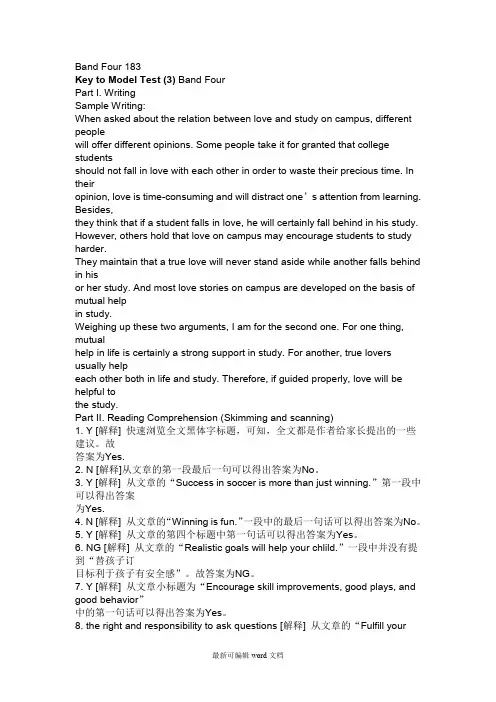
Band Four 183Key to Model Test (3) Band FourPart I. WritingSample Writing:When asked about the relation between love and study on campus, different peoplewill offer different opinions. Some people take it for granted that college studentsshould not fall in love with each other in order to waste their precious time. In theiropinion, love is time-consuming and will distract one’s attention from learning. Besides,they think that if a student falls in love, he will certainly fall behind in his study. However, others hold that love on campus may encourage students to study harder.They maintain that a true love will never stand aside while another falls behind in hisor her study. And most love stories on campus are developed on the basis of mutual helpin study.Weighing up these two arguments, I am for the second one. For one thing, mutualhelp in life is certainly a strong support in study. For another, true lovers usually helpeach other both in life and study. Therefore, if guided properly, love will be helpful tothe study.Part II. Reading Comprehension (Skimming and scanning)1. Y [解释] 快速浏览全文黑体字标题,可知,全文都是作者给家长提出的一些建议。
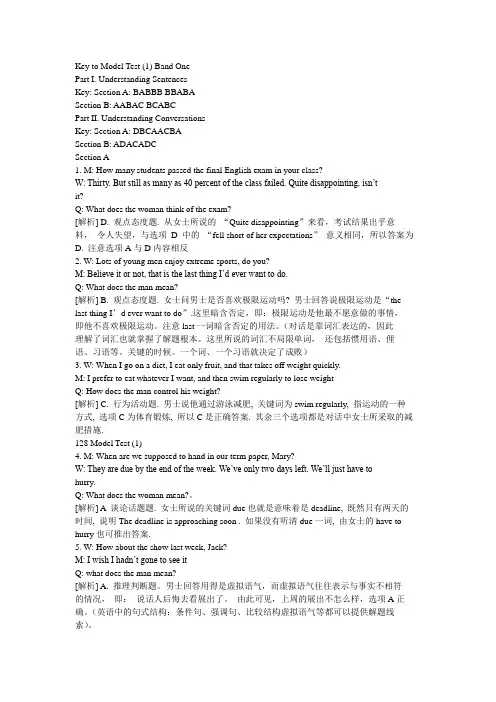
Key to Model Test (1) Band OnePart I. Understanding SentencesKey: Section A: BABBB BBABASection B: AABAC BCABCPart II. Understanding ConversationsKey: Section A: DBCAACBASection B: ADACADCSection A1. M: How many students passed the final English exam in your class?W: Thirty. But still as many as 40 percent of the class failed. Quite disappointing, isn’tit?Q: What does the woman think of the exam?[解析] D. 观点态度题. 从女士所说的“Quite disappointing”来看,考试结果出乎意料,令人失望,与选项D 中的“fell short of her expectations”意义相同,所以答案为D. 注意选项A与D内容相反2. W: Lots of young men enjoy extreme sports, do you?M: Believe it or not, that is the last thing I’d ever want to do.Q: What does the man mean?[解析] B. 观点态度题. 女士问男士是否喜欢极限运动吗? 男士回答说极限运动是“the last thing I’d ever want to do”.这里暗含否定,即:极限运动是他最不愿意做的事情,即他不喜欢极限运动。
注意last一词暗含否定的用法。
(对话是靠词汇表达的,因此理解了词汇也就掌握了解题根本。
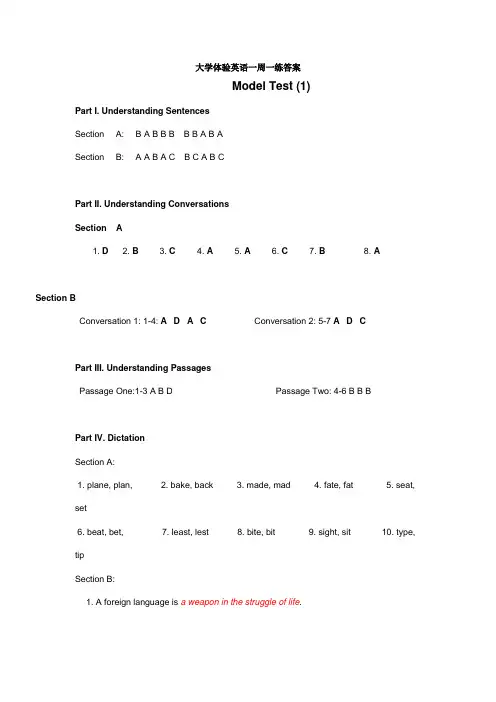
大学体验英语一周一练答案Model Test (1)Part I. Understanding SentencesSection A: B A B B B B B A B ASection B: A A B A C B C A B CPart II. Understanding ConversationsSection A1. D2. B3. C4. A5. A6. C7. B8. ASection BConversation 1: 1-4: A D A C Conversation 2: 5-7 A D CPart III. Understanding PassagesPassage One:1-3 A B D Passage Two: 4-6 B B BPart IV. DictationSection A:1. plane, plan,2. bake, back3. made, mad4. fate, fat5. seat,set6. beat, bet,7. least, lest8. bite, bit9. sight, sit 10. type,tipSection B:1. A foreign language is a weapon in the struggle of life.2. We must believe that each one of us is able to do something well, and that, when we discover what thissomething is, we must work until we succeed.3. There is no light during the night although there is a light on the right.4. She didn’t sit on the seat and here is the bill for the beer.5. A small leak will sink a great ship.6. There is no secret of success but hard work.7. Have an aim in life, or your energies will all be wasted.8. No sweet without sweat.9. A man of words and not of deeds is like a garden full of weeds.10. An hour in the morning is worth two in the evening.Part V. Vocabulary and Structure1. D2. A3. D4. A5. A6. C7. B8. B9. C 10. C11. C 12. C 13. B 14. D 15. C 16. D 17. D 18. A 19.B 20. BPart VI. Reading Comprehension (Reading in Depth)1. C2. I3. K4. L5. G6. O7. B8. E9.D 10. FPart VII. Error correction1. way∧fnd out → to2. tracking → track3. i n → across4. profts → benefts5. made → taken6. from →in7. added∧the air → to8. into → /9. soak∧the ground → into10. these → newModel Test (2)Key to Model Test (2) Band OnePart I. Understanding SentencesSection A: BBABB ABBBASection B: ABAAA CAABCPart II. Understanding ConversationsSection A: DADDA BBDSection B: A ABDACCPart III. Understanding PassagesPassage one:DAB Passage Two:ACCCPart IV. Spot Dictation1. celebrate2. national holiday3. set aside4. English settlers5. having survived6. 16217. having harvested8. share in9. relatives 10. specialPart V. Reading Comprehension1. B2. D3. A4. C5. D6. A7. C8. D9.B 10. CPart VI. Vocabulary and Structure1. C2. D3. C4. B5. D6. B7. B8. B9. D 10. D11. C 12. A 13. C 14. A 15. C 16. D 17. A 18. C 19.B 20. BPart VII. Translation1. regardless of the cost2. When the fire broke out3. the more progress you will make4. without hard work5. In other wordsModel Test (3)Part I. Understanding SentencesSection A: ABAAB ABBAASection B: ABABA CABABPart II. Understanding ConversationsSection A: DCACB BDBSection B: BCBABCAPart III. Understanding PassagesPassage one:CABPassage Two:ABACPart IV. Dictation1. experience2. frustrating3. published4. communicate5. participate6. insights7. Finally8. graduated9. standard 10. attentionPart V. Reading Comprehension (Skimming and Scanning)1. Y2. Y3. N4. N5.Y6.N 7. NG8. measurements 9. The thing you purposely change 10. the results are similar each timePart VI. Error correction1. seldom → never2. at → on3. by → in4. proverb∧says → which/that5. retained → regained6. others → others’7. on → of9. if →unless10. be attended∧→ toPart VII . Writing (略)Model Test (4)Part I. Understanding SentencesSection A: BBABB BABAB Section B: BACAC CACAAPart II. Understanding ConversationsSection A: DCABC DBC Section B: DCACADCPart III. Understanding PassagesPassage one: ABC Passage Two: CCCAPart IV. Dictation1. severely2. balance3. embarrassed4.growing 5. reluctance6. adjusted7. subjecting8. complaint9. fortunate 10. enviousPart V. Vocabulary and Structure1. A2. C3. B4. C5. A6. A7. C8. C9. A 10. C11. A 12. D 13. D 14. A 15. B 16. D 17. A 18. C 19.B 20. APart VI. Reading Comprehension1. C2. C3. B4. A5. B6. C7. B8. A9.C 10. DPart VII. Writing(略)Model Test (5)Part I. Understanding SentencesSection A: BABAB ABBAASection B: AACBA CBCABPart II. Understanding ConversationsSection A: D C C B A C A BSection B: C C D A D C DPart III. Understanding PassagesPassage one: CAA Passage Two: ABBDPart IV. Spot Dictation1. essential2. accomplish3. purposes4. convince5. proper6. occasion7. conveyed8. objective9. state 10. definitePart V. Reading Comprehension (Skimming and Scanning)1. Y2. N3. N4. Y5. N6. N7. Y8. Table tennis 9. ancient Greece 10. 1976。
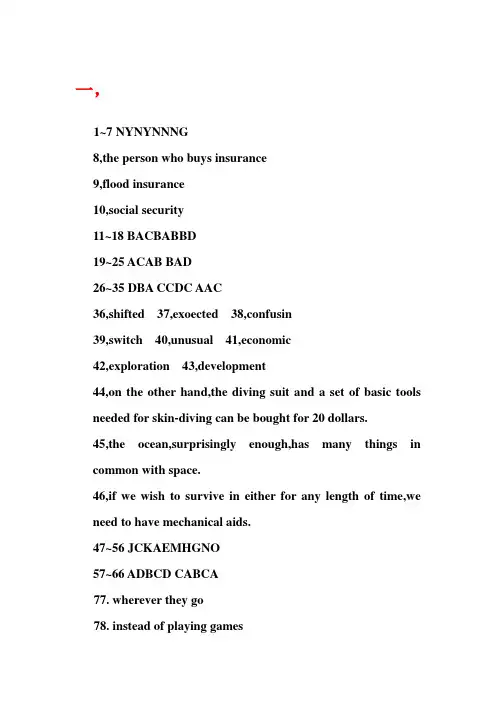
一,1~7 NYNYNNNG8,the person who buys insurance9,flood insurance10,social security11~18 BACBABBD19~25 ACAB BAD26~35 DBA CCDC AAC36,shifted 37,exoected 38,confusin39,switch 40,unusual 41,economic42,exploration 43,development44,on the other hand,the diving suit and a set of basic tools needed for skin-diving can be bought for 20 dollars.45,the ocean,surprisingly enough,has many things in common with space.46,if we wish to survive in either for any length of time,we need to have mechanical aids.47~56 JCKAEMHGNO57~66 ADBCD CABCA77. wherever they go78. instead of playing games79. Despite the bad weather80. haven’t made up my mind81. can we buy fresh fruit二、1~7 YYNGNYYN8,486 9. February, 1967 to March, 1969 10, 16 feet11-18 BCAAADBA 19-21 ACB 22-25 CABB 26-29 CCDD 30-32 CBC 33-35 ABD36. passengers 37. 891 38. ship39. regarded 40. tragic 41. voyage42. setting 43. sharply44. The noise had been so faint that no one thought that theship had been damaged45. The order to abandon ship was given and hundreds ofpeople plunged into the icy water46~55 AONBMEGHJK56~85 CDDCB BBCCD CBADA DBACD ACCDB BAACA86. much less spoken to him87. waged a massive ad campaign to promote itsair-conditioner sales88. ups and downs89. As long as you set a goal for yourself90. everyone must confine his remarks to the subject三、1~7 NYYNGNNY8, the early 1920s 9. 1926 10. a sharp upsurge11-18 CDBABCCD 19-21 ABD 22-25 CAAC 26-28 BBC 29-31 CDA 32-35 BABB36. industries 37. efforts38. succeeds 39. economic 40. wealth41. ancient 42. national 43. remained44. the contests became increasingly less amateur and citiesbegan to hire athletes to represent them45. the Olympics were ruined, and were ended soon after that46. Now Olympic athletes are eager to sell their names tocompanies that make everything from ski equipment to fast food47~56 JCKAEMHGNO57~66 BCDBA DAACD67. a改成the 68. American改成America69. wave改成waving 70. By ∧ way → the71. is改成are 72. has改成have73. Independence ∧ signed → was 74. rightly改成right75. 去掉not 76. doing改成done77. Despite/In spite of some spelling mistakes78. to distinguish right from wrong79. As long as you set a goal for yourself80. compared with mine81. it was Jerry that had broken the window四、1~7 YYNYNNY8. a regular schedule9. using the eye10. mechanical drills11-18 BABDBAAB 19-22 BCDA 23-25 DBC26-28 ADB 29-31DDC 32-35 BABA 36. shocked 37. two 38. stand 39. assume 40. apart 41. push42. pets 43. take good care of their pets44. They do not get special food or special treatment45. Americans do not understand this attitude towardanimals46~57 NEIDOGBFJC56~67 ACADD DCDCA66. old∧the → when 67. nothing 改成something68. lived in 改成lived 69. suffer 改成suffered70. acustomed 改成accustomed71. too young∧understand → to72. had been∧bombs → no 73. eat 改成eaten74. heard∧→ of 75. means 改成meant76. remains to be seen in a few weeks77. together with countless roses78. As long as you never lose heart79. At best he’s ambitious80. at the expense of the environment五、1~7 NYNGYYNGN8. fighting disease or supporting local hospitals and schools9. healthy enough to try this difficult event10. The future of marathons11-18 ABDDCADA 19-21 AAB 22-25 BDBA26-28 BAD 29-31 BDD 32-35 CADD36. career 37. key 38. personal39. seldom 40. separates 41. persistence42. occasionally 43. defeat44. learn from defeats, revise their strategy as needed and try again45. and learn nothing from their experience46. If you are persistent, you will almost inevitably succeed47~56 HFGADLMCOE57~66 BBACB CBDDC67~86 ACDAB CBDBA DCDAB DCABD87. is well acquainted with the problems in the hospital88. nothing is more attractive to me than music / to me, nothing is more important than music89. attempts to escape being fined90. not to mention / let alone going abroad91. didn’t do anything六、1~7 YYYYNGNN8. Los Angeles 9. 48 percent 10. $44811-18 BBBDCCBC 19-21 ABC 22-25 CABA26-29 BCCC 30-32 BAC 33-35 BAB36. pyramids 37. tombs 38. remember39. oldest 40. 144 41. solid42. treasures43. Robbers went into the pyramids and took away many of these treasures44. Each pyramid has a wide stairway that goes from the bottom to the top45. Each stone fits so well and they did not have our modern machines46~55 HDJFAICGKN56~65 CDDCD ADDDC66. am改成was 67. worrying改成worried68. listened∧my改成to 69. temperatures改成temperature 70. complete改成completed 71. 去掉the72. for∧few改成a 73. drinks改成drinking74. something改成nothing 75. worse改成better76. I know all along77. by time78. much remains to be settled79. made great contributions to the artistic field80. as though he knew everything七、1~7 NNGNYYYY8. ensure the competition of Cambridge in the world / ensure Cambridge can competescientifically at a world level9. university departments and charitable and commercial research centers10. students need advice and high-quality tuition on the spot11-18 BBDCDDBA 19-21 CDA 22-25 BDCC 26-28 CDD29-31 BDA 32-35 CACD 36. fascinates 37. characteristics38. personalities 39. encouraged 40. forbidding 41. experience 42. opposed 43. honors44. what his parents might have expected45. which I can see must have come from his family46. but to be gentle in one’s own everyday life47~56 JOINDKECAG57~86 DCACB ABACD BCADA CDBAB DBCAD BCBDA87. he be offended / annoyed88. beyond our imagination / more than we can imagine89. could not help laughing90. it is twice as expensive as it was a few years ago91. turned a deaf ear to our warning / ignored our warning 八、1~7 YNYYNGNN8. federal employees 9. have more control over their hours 10. how a lot of people live11-18 BBABCDBD 19-22 BCDB 23-25 ABA 26-28 BAA29-32 ABAB 33-35 DBC 36. subject 37. Admissions38. earned 39. difficulty 40. interests 41. accepted42. consideration 43. either44. need to take SAT subject tests in areas like history, scienceand foreign language45. It is designed to measure what a student has learned in school46. Without it, the ACT takes about three hours to complete47~56 BOAIKHGLED57~66 BABAB CABAD67. with改成for 68. informations改成information69. who∧ → is 70. writing改成written71. make改成take 72. particular改成particularly73. except改成besides 74. But改成So75. indicates改成indicate 76. which → /∧which → in77. It is because she is too inexperienced78. would not have finished so early79. may just as well stay at home80. for fear that he should be recognized81. being sent abroad to study。
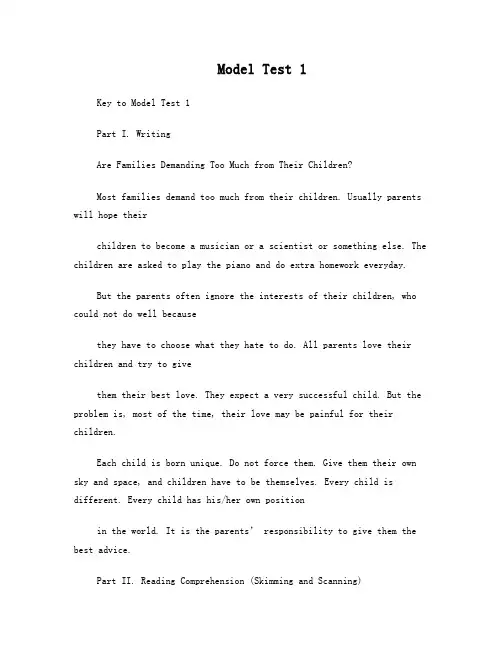
Model Test 1Key to Model Test 1Part I. WritingAre Families Demanding Too Much from Their Children?Most families demand too much from their children. Usually parents will hope theirchildren to become a musician or a scientist or something else. The children are asked to play the piano and do extra homework everyday.But the parents often ignore the interests of their children, who could not do well becausethey have to choose what they hate to do. All parents love their children and try to givethem their best love. They expect a very successful child. But the problem is, most of the time, their love may be painful for their children.Each child is born unique. Do not force them. Give them their own sky and space, and children have to be themselves. Every child is different. Every child has his/her own positionin the world. It is the parents’ responsibility to give them the best advice.Part II. Reading Comprehension (Skimming and Scanning)1. N 根据文章的小标题可知文章介绍的是关于保险的一些内容,而政府提供的保险只是其中的内容之一,并不是文章的主要内容。
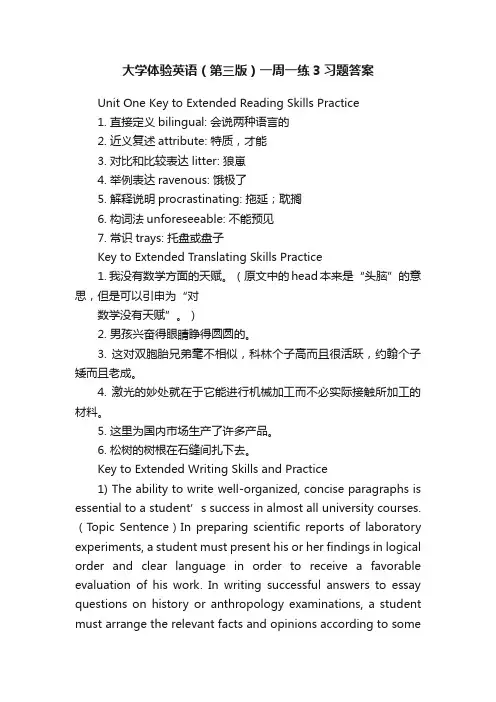
大学体验英语(第三版)一周一练3习题答案Unit One Key to Extended Reading Skills Practice1. 直接定义bilingual: 会说两种语言的2. 近义复述attribute: 特质,才能3. 对比和比较表达litter: 狼崽4. 举例表达ravenous: 饿极了5. 解释说明procrastinating: 拖延;耽搁6. 构词法unforeseeable: 不能预见7. 常识trays: 托盘或盘子Key to Extended Translating Skills Practice1. 我没有数学方面的天赋。
(原文中的head本来是“头脑”的意思,但是可以引申为“对数学没有天赋”。
)2. 男孩兴奋得眼睛睁得圆圆的。
3. 这对双胞胎兄弟毫不相似,科林个子高而且很活跃,约翰个子矮而且老成。
4. 激光的妙处就在于它能进行机械加工而不必实际接触所加工的材料。
5. 这里为国内市场生产了许多产品。
6. 松树的树根在石缝间扎下去。
Key to Extended Writing Skills and Practice1) The ability to write well-organized, concise paragraphs is essential to a student’s success in almost all university courses. (Topic Sentence)In preparing scientific reports of laboratory experiments, a student must present his or her findings in logical order and clear language in order to receive a favorable evaluation of his work. In writing successful answers to essay questions on history or anthropology examinations, a student must arrange the relevant facts and opinions according to someaccepted pattern of paragraph structure. And certainly in writing a book report for English, or a critique for political studies, or a term paper for sociology, a student must pay attention to the style and organization as well as the content. (Developing sentences) Clearly, skill in expository writing is crucial to successful achievement in most university subjects. (Concluding sentence)2) This term several useful and interesting courses have been offered.(T opic Sentence)An introduction to European Culture, for instance, gives us a lot of background knowledge of the history of European philosophy, literature, and arts. From time to time we see slide shows of famous paintings and hear tapes of famous pieces of music, and they make the lectures all the more interesting. American Society and Culture is another course that attracts a large audience. The teacher, who visited the United States not long ago, discusses new trends and changes in American life as well as American history and traditions. (Developing sentences) We like these and other courses very much, because they help us not only to improve our English but also to broaden our vision. (Concluding sentence)Key to Review and Test (1)Part I Writing(略)Part II. Reading Comprehension(Skimming and Scanning)1-7 B C C A A B B8.reminds 9. accounting for 10. total emissionPart III. Listening Comprehension11-25 CDBAC CCBBA BCACB 26-35 BCABB DCBAD36 last 37 largest 38 educate 39 present40 single 41 officials 42 celebrated 43 attend44 The fair provides a chance for the farming communitiesto show its skills and faming products.45 Today, children and adults at the fair can play new computer games, or attend more traditionalgames of skill.46 because people need to remember that they’re connected to the earth and its products,Part IV. Reading Comprehension (Reading in Depth)47-56 D B E I J K O M A H57-61 CBDCA 62-66 CBBDCPart V. Cloze67-76 ACBCA DBACA 77-86 DDABC DDBBAPart VI. Translation87 at the expense of his health88 were overtaken by bad weather89 take the engine apart90 a family who can’t communicate with each other91 At this rate, we’ll soon be bankruptUnit TwoKey to Extended Reading Skills Practice1microphone autobiography invisible postdoctoral unbreakable forecast incapable interdepartmental incorrect disagree trans-Atlantic disability irregular misunderstand superpower telescope overestimated unnatural2recommendation persistence imagination physicist creativity leadership purification musician curiosity cultural modernization childhood/childish simplicity/simplistic dangerous marriage hopefully specialize developmentKey to Extended Translating Skills Practice1 妈妈为了挣足够的钱让我接受教育,经常承担额外的工作。
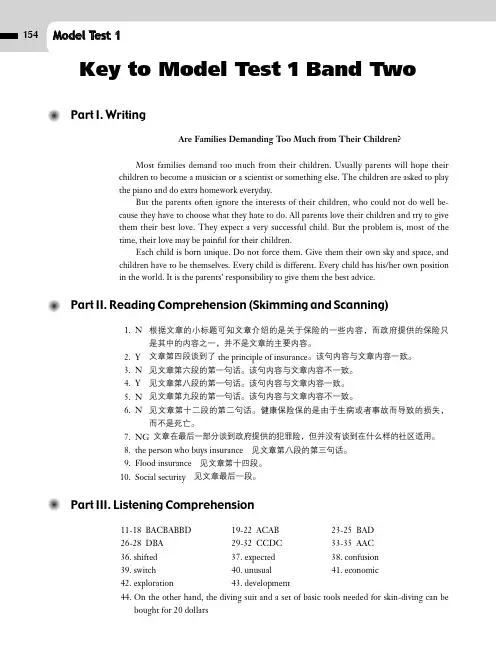
Part I. WritingAre Families Demanding Too Much from Their Children? Most families demand too much from their children. Usually parents will hope their children to become a musician or a scientist or something else. The children are asked to play the piano and do extra homework everyday. But the parents often ignore the interests of their children, who could not do well be-cause they have to choose what they hate to do. All parents love their children and try to give them their best love. They expect a very successful child. But the problem is, most of the time, their love may be painful for their children. Each child is born unique. Do not force them. Give them their own sky and space, and children have to be themselves. Every child is different. Every child has his/her own position in the world. It is the parents’ responsibility to give them the best advice.Part II. Reading Comprehension (Skimming and Scanning) 1. N 根据文章的小标题可知文章介绍的是关于保险的一些内容,而政府提供的保险只是其中的内容之一,并不是文章的主要内容。
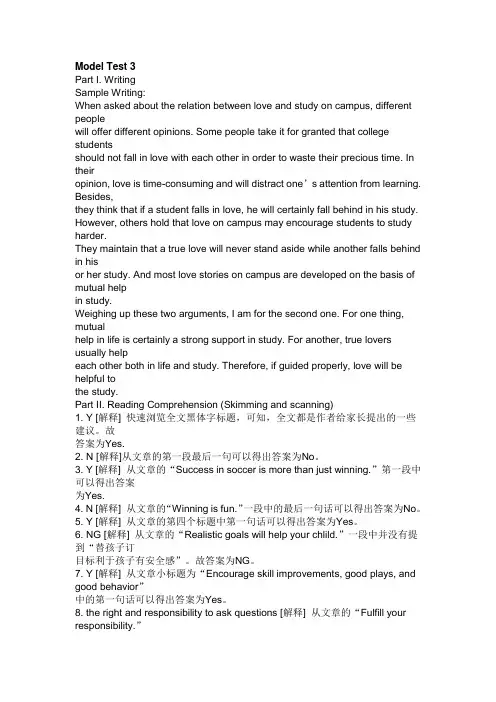
Model Test 3Part I. WritingSample Writing:When asked about the relation between love and study on campus, different peoplewill offer different opinions. Some people take it for granted that college studentsshould not fall in love with each other in order to waste their precious time. In theiropinion, love is time-consuming and will distract one’s attention from learning. Besides,they think that if a student falls in love, he will certainly fall behind in his study. However, others hold that love on campus may encourage students to study harder.They maintain that a true love will never stand aside while another falls behind in hisor her study. And most love stories on campus are developed on the basis of mutual helpin study.Weighing up these two arguments, I am for the second one. For one thing, mutualhelp in life is certainly a strong support in study. For another, true lovers usually helpeach other both in life and study. Therefore, if guided properly, love will be helpful tothe study.Part II. Reading Comprehension (Skimming and scanning)1. Y [解释] 快速浏览全文黑体字标题,可知,全文都是作者给家长提出的一些建议。
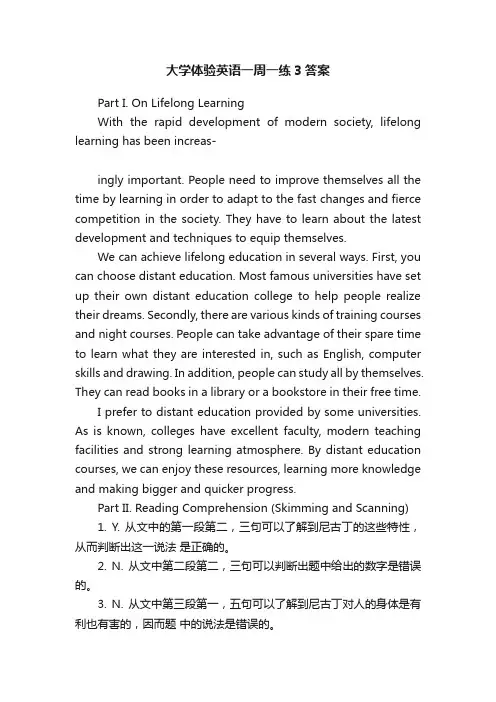
大学体验英语一周一练3答案Part I. On Lifelong LearningWith the rapid development of modern society, lifelong learning has been increas-ingly important. People need to improve themselves all the time by learning in order to adapt to the fast changes and fierce competition in the society. They have to learn about the latest development and techniques to equip themselves.We can achieve lifelong education in several ways. First, you can choose distant education. Most famous universities have set up their own distant education college to help people realize their dreams. Secondly, there are various kinds of training courses and night courses. People can take advantage of their spare time to learn what they are interested in, such as English, computer skills and drawing. In addition, people can study all by themselves. They can read books in a library or a bookstore in their free time.I prefer to distant education provided by some universities. As is known, colleges have excellent faculty, modern teaching facilities and strong learning atmosphere. By distant education courses, we can enjoy these resources, learning more knowledge and making bigger and quicker progress.Part II. Reading Comprehension (Skimming and Scanning)1. Y. 从文中的第一段第二,三句可以了解到尼古丁的这些特性,从而判断出这一说法是正确的。
Keys (Unit 1)Extended Reading Skills Practice1.“a very young child— or even an animal —can learn to recognize faces”2.“We also tell people apart by how they behave”3.“People have always tried to‘type’ each other”4. DExtended Translating Skills Practice1. 地球的大小是月球的49倍/ 地球比月球大48倍。
2.冰箱的销售量增加了两倍半 / 增加到三倍半。
3. 他过去数年间的收入已增长两倍/ 是以前的三倍。
4. 在过去五年中,该国武器进口量降低了3/4(降低到1/4)。
5. 这所小学的学生数量锐减了63%。
Extended Writing Skills Practice (略)Review and TestPart I. Writing(略)Part II. Reading Comprehension1-5 CBACA 6-7 DA8. the conviction of many men 9. its priceless value10. margins of between 1 and 3 percent in various votersPart III. Listening Comprehension11-15 CBACD 16-18 BDA 19-22 BDAC 23-25 DBC26-28 CDB 29-32 BCCB 33-35 CAB36. throughout 37. obviously 38. breadwinner 39. raising40. common 41. nursery 42. varying 43. unusual44. has been to have both men and women share in children care, housework andfinancial responsibilities45. Many American women enjoy the independence that an outside job and the salarygive them46. American women, however, have met challenges since pioneer days, and theycontinue to fight for true equalityPart IV. Reading Comprehension (Reading in Depth)Section A47-51 KJEAM 52-56 OIBNDSection B57-61 CDDAB 62-66 BACCDPart V. Cloze67-71 BCDBA 72-76 ADCBD 77-81 ACBDC 82-86 ABDCAPart VI. Translation87. the less likely you are to catch a cold88. was his father not around89. the only time she feels very happy90. are not as important to fathers91. Those fathers who strive to be good family menKeys (Unit 2)Extended Reading Skills Practice1-5 FOFOOExtended Translating Skills Practice1. 他的数学分数在班上是名列前茅的。
Model Test 1Key to Model Test (1) Band FourPart I. WritingSample Writing:A Reply to A FriendDear John,I received your letter yesterday. In reply to your inquiry about applying for admission to my university, I would like to give you the following suggestions. My school is a comprehensive university with such disciplines as science, engineering, the arts, economy, management, law and education. Among all the majors, I suggest that you should apply for the major of computer science and technology. There are some reasons for this suggestion. First, the computer personnel are in great demand owing to the widespread use of computers in every field. Therefore, you can find a job easily if you have a degree in this major. Second, my university has first-rate facilities and excellent teachers in this field. You will definitely benefit from studying in my university. There are some requirements for this major. To begin with, you must have a good foundation in math and English. Knowledge in these two subjects is essential for doing well in this major. In addition, you have to pay a higher tuition fee than students of other majors. Of course, you have to make some preparations for the test. On the one hand, you need to learn something about the computer. On the other hand, you should have basic knowledge about English before coming to the university. Otherwise, you will have difficulty in learning well in this major. I hope the above suggestions helpful to you. Wish you good luck.Yours Sincerely,DavidPart II. Reading Comprehension (Skimming and Scanning)1-7 Y Y N Y NG N Y8. face-to-face and respect 9. a favor or debt should never be forgotten10. to make friends and keep themPart III. Listening Comprehension11. C. 该题考查说话人所处的地点. 根据对话中的关键词books, return, overdue可以确定对话地点在图书馆。
Key to Model Test (1) Band FourPart I. WritingSample Writing:A Reply to A FriendDear John,I received your letter yesterday. In reply to your inquiry about applying for admis -sion to my university, I would like to give you the following suggestions.My school is a comprehensive university with such disciplines as science, engi-neering, the arts, economy, management, law and education. Among all the majors, Isuggest that you should apply for the major of computer science and technology. Thereare some reasons for this suggestion. First, the computer personnel are in great demandowing to the widespread use of computers in every field. Therefore, you can find a jobeasily if you have a degree in this major. Second, my university has first-rate facilitiesand excellent teachers in this field. You will definitely benefit from studying in my uni -versity. There are some requirements for this major. To begin with, you must have a goodfoundation in math and English. Knowledge in these two subjects is essential for do -ing well in this major. In addition, you have to pay a higher tuition fee than students ofother majors.Of course, you have to make some preparations for the test. On the one hand, youneed to learn something about the computer. On the other hand, you should have basic knowledge about English before coming to the university. Otherwise, you will have dif -ficulty in learning well in this major.I hope the above suggestions helpful to you. Wish you good luck.Yours Sincerely,DavidPart II. Reading Comprehension (Skimming and Scanning)1-7 Y Y N Y NG N Y8. face-to-face and respect 9. a favor or debt should never be forgotten10. to make friends and keep themPart III. Listening Comprehension11. C. 该题考查说话人所处的地点. 根据对话中的关键词books, return, overdue 可以确定对话地点在图书馆。
大学体验英语一周一练答案Model Test (1)Part I. Understanding SentencesSection A: B A B B B B B A B ASection B: A A B A C B C A B CPart II. Understanding ConversationsSection A1. D2. B3. C4. A5. A6. C7. B8. ASection BConversation 1: 1-4: A D A C Conversation 2: 5-7 A D CPart III. Understanding PassagesPassage One:1-3 A B D Passage Two: 4-6 B B BPart IV. DictationSection A:1. plane, plan,2. bake, back3. made, mad4. fate, fat5. seat,set6. beat, bet,7. least, lest8. bite, bit9. sight, sit 10. type,tipSection B:1. A foreign language is a weapon in the struggle of life.2. We must believe that each one of us is able to do something well, and that, when we discover what thissomething is, we must work until we succeed.3. There is no light during the night although there is a light on the right.4. She didn’t sit on the seat and here is the bill for the beer.5. A small leak will sink a great ship.6. There is no secret of success but hard work.7. Have an aim in life, or your energies will all be wasted.8. No sweet without sweat.9. A man of words and not of deeds is like a garden full of weeds.10. An hour in the morning is worth two in the evening.Part V. Vocabulary and Structure1. D2. A3. D4. A5. A6. C7. B8. B9. C 10. C11. C 12. C 13. B 14. D 15. C 16. D 17. D 18. A 19.B 20. BPart VI. Reading Comprehension (Reading in Depth)1. C2. I3. K4. L5. G6. O7. B8. E9.D 10. FPart VII. Error correction1. way∧fnd out → to2. tracking → track3. in → across4. profts → benefts5. made → taken6. from →in7. added∧the air → to8. into → /9. soak∧the ground → into10. these → newModel Test (2)Key to Model Test (2) Band OnePart I. Understanding SentencesSection A: BBABB ABBBASection B: ABAAA CAABCPart II. Understanding ConversationsSection A: DADDA BBDSection B: A ABDACCPart III. Understanding PassagesPassage one:DAB Passage Two:ACCCPart IV. Spot Dictation1. celebrate2. national holiday3. set aside4. English settlers5. having survived6. 16217. having harvested8. share in9. relatives 10. specialPart V. Reading Comprehension1. B2. D3. A4. C5. D6. A7. C8. D9.B 10. CPart VI. Vocabulary and Structure1. C2. D3. C4. B5. D6. B7. B8. B9. D 10. D11. C 12. A 13. C 14. A 15. C 16. D 17. A 18. C 19.B 20. BPart VII. Translation1. regardless of the cost2. When the fire broke out3. the more progress you will make4. without hard work5. In other wordsModel Test (3)Part I. Understanding SentencesSection A: ABAAB ABBAASection B: ABABA CABABPart II. Understanding ConversationsSection A: DCACB BDBSection B: BCBABCAPart III. Understanding PassagesPassage one:CABPassage Two:ABACPart IV. Dictation1. experience2. frustrating3. published4. communicate5. participate6. insights7. Finally8. graduated9. standard 10. attentionPart V. Reading Comprehension (Skimming and Scanning)1. Y2. Y3. N4. N5.Y6.N 7. NG8. measurements 9. The thing you purposely change 10. the results are similar each timePart VI. Error correction1. seldom → never2. at → on3. by → in4. proverb∧says → which/that5. retained → regained6. others → others’7. on → of9. if →unless10. be attended∧→ toPart VII . Writing (略)Model Test (4)Part I. Understanding SentencesSection A: BBABB BABAB Section B: BACAC CACAAPart II. Understanding ConversationsSection A: DCABC DBC Section B: DCACADCPart III. Understanding PassagesPassage one: ABC Passage Two: CCCAPart IV. Dictation1. severely2. balance3. embarrassed4.growing 5. reluctance6. adjusted7. subjecting8. complaint9. fortunate 10. enviousPart V. Vocabulary and Structure1. A2. C3. B4. C5. A6. A7. C8. C9. A 10. C11. A 12. D 13. D 14. A 15. B 16. D 17. A 18. C 19.B 20. APart VI. Reading Comprehension1. C2. C3. B4. A5. B6. C7. B8. A9.C 10. DPart VII. Writing(略)Model Test (5)Part I. Understanding SentencesSection A: BABAB ABBAASection B: AACBA CBCABPart II. Understanding ConversationsSection A: D C C B A C A BSection B: C C D A D C DPart III. Understanding PassagesPassage one: CAA Passage Two: ABBDPart IV. Spot Dictation1. essential2. accomplish3. purposes4. convince5. proper6. occasion7. conveyed8. objective9. state 10. definitePart V. Reading Comprehension (Skimming and Scanning)1. Y2. N3. N4. Y5. N6. N7. Y8. Table tennis 9. ancient Greece 10. 1976。
Part VI. Error correction1. that → what2. dependent →dependable3. of → for4. in → at5. possible → likely6. in → out7. how →that / in which8. occur →happen9. was ∧in →like10. on → to / with:Part VII. Translation1. passed the test without much difficulty2. because of lack of money and necessary equipment3. take responsibility for the accident4. As usual5. was so absorbed in her bookModel Test (6)Part I. Understanding SentencesKey: Section A: AAAAB ABAABSection B: ABCBC CAABCPart II. Understanding ConversationsKey: Section A: AABDC CACSection B: CAB DBAAPart III. Understanding PassagesPassage one Answers: 1-3 CACPassage Two Answers: 4-7 ACCBPart IV. Spot Dictation1. quality2. available3. committed4. recognize5. adjust6. concerned7. motivation8. responsible9. contribute 10. advantagePart V. Vocabulary and Structure1. C2. C3. D4. D5. A6. A7. C8. B9. A 10. A11. C 12. C 13. A 14. D 15. B 16. D 17. C 18. C 19.C 20. APart VI. Reading Comprehension1. B2. C3. A4. A5. C6. A7. B8. C9.D 10. DPart VII. Translation1. couldn’t help laughing2. keep pace with times / keep up with times3. In the long run4. an excuse for breaking the law5. might as well stay at homeModel Test (7)Part I. Understanding SentencesSection A: BAABA BABAASection B: BAABA CBACAPart II. Understanding ConversationsSection A: CCCCB DACSection B: BAA ADBCPart III. Understanding PassagesPassage one:CAD Passage Two: BACDPart IV. Spot Dictation1. proposed2. developed3. intense4. distant objects5. staring at them6. beneficial7. vision 8. involves 9. excessive 10. relax their eyes frequentlyPart V. Reading Comprehension (Skimming and Scanning)1. Y2. Y3. N4. NG5. Y6. N7. N8. robots 。